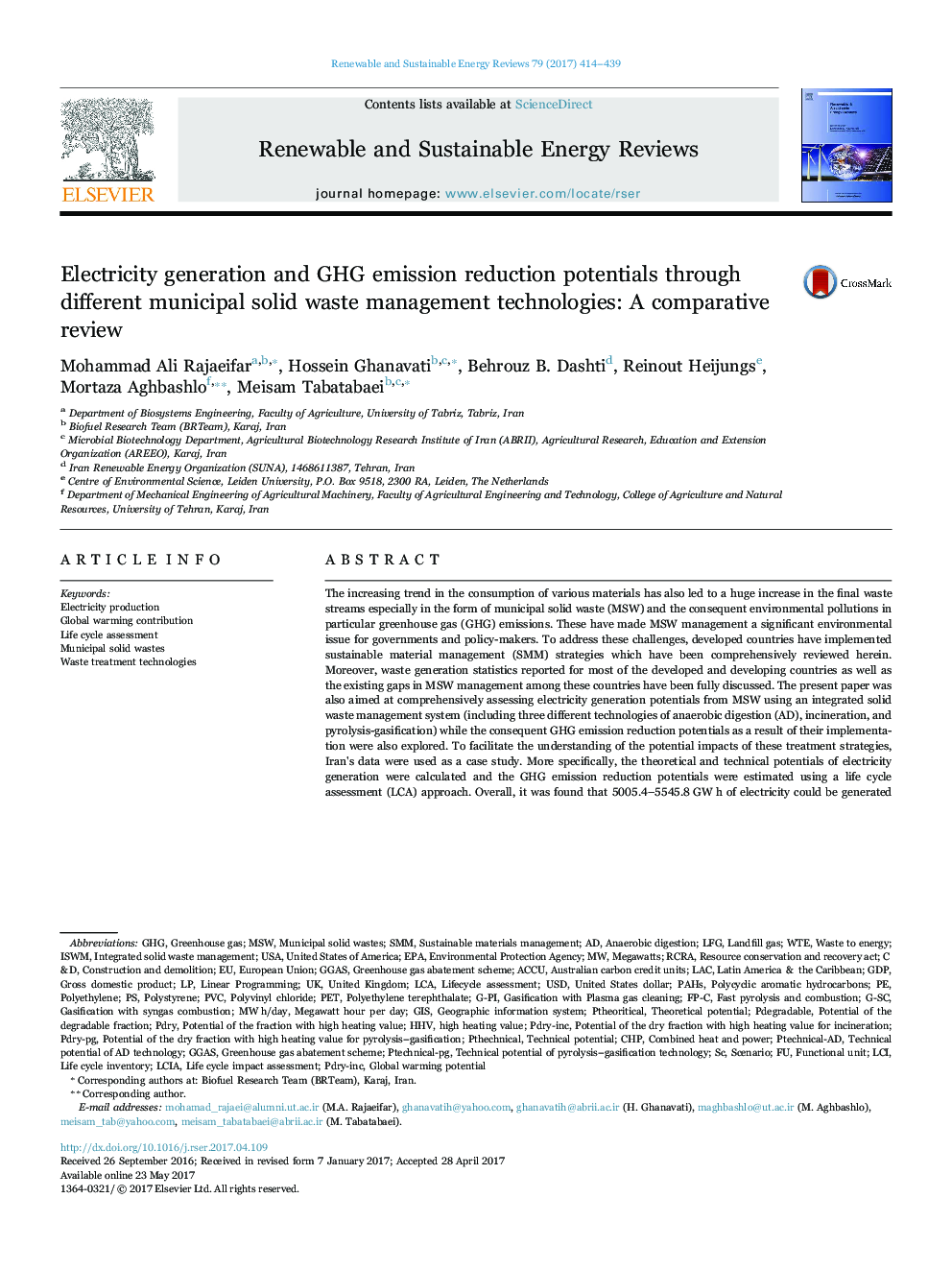| کد مقاله | کد نشریه | سال انتشار | مقاله انگلیسی | نسخه تمام متن |
|---|---|---|---|---|
| 5482578 | 1522307 | 2017 | 26 صفحه PDF | دانلود رایگان |
عنوان انگلیسی مقاله ISI
Electricity generation and GHG emission reduction potentials through different municipal solid waste management technologies: A comparative review
ترجمه فارسی عنوان
تولید برق و پتانسیل کاهش انتشار گازهای گلخانه ای از طریق تکنولوژی های مختلف مدیریت زباله های شهری شهری: یک بررسی مقایسه ای
دانلود مقاله + سفارش ترجمه
دانلود مقاله ISI انگلیسی
رایگان برای ایرانیان
کلمات کلیدی
EPAMegawattsresource conservation and recovery actRCRALCIASMMACCUHHVLCILFGMSWWTEGHGCHPLACScenario - سناریوC&D - C & DEnvironmental Protection Agency - آژانس حفاظت از محیط زیستEuropean Union - اتحادیه اروپاLife cycle impact assessment - ارزیابی تاثیر چرخه زندگیLifecycle assessment - ارزیابی چرخه حیاتLCA - ارزیابی چرخه حیاتLife Cycle Assessment - ارزیابی چرخه عمر یا چرخه حیاتUnited States of America - ایالات متحده آمریکاUSA - ایالات متّحدهٔ آمریکاLinear programming - برنامهریزی خطیCombined Heat and Power - ترکیب گرما و قدرتElectricity production - تولید برقGross domestic product - تولید ناخالص داخلیGDP - تولید ناخالص ملیUnited States dollar - دلار آمریکاUSD - دلار آمریکاwaste to energy - زباله به انرژیConstruction and demolition - ساخت و ساز و تخریبGIS - سامانه اطلاعات جغرافیاییGeographic information system - سیستم اطلاعات جغرافیاییIntegrated solid waste management - مدیریت مجدد جامدات جامدSustainable materials management - مدیریت مواد پایدارMunicipal solid wastes - مواد زائد جامد شهریLife Cycle Inventory - موجودی چرخه زندگیAnaerobic digestion - هضم بیهوازیPolycyclic aromatic hydrocarbons - هیدروکربن آروماتیک چندحلقهایPAHs - هیدروکربن های آروماتیک چند حلقه ایfunctional unit - واحد عملکردیUnited Kingdom - پادشاهی متحده بریتانیاPET - پتTechnical potential - پتانسیل فنیglobal warming potential - پتانسیل گرمایش جهانیPolyethylene - پلی اتیلنPolyethylene terephthalate - پلی اتیلن ترفتالاتPolystyrene - پلیاستایرن PVC - پلیوینیل کلراید یا پیویسیPolyvinyl chloride - کلرید پلی وینیلLandfill gas - گاز دفن زبالهGreenhouse gas - گاز گلخانه ایHigh heating value - گرمای زیاد
موضوعات مرتبط
مهندسی و علوم پایه
مهندسی انرژی
انرژی های تجدید پذیر، توسعه پایدار و محیط زیست
چکیده انگلیسی
The increasing trend in the consumption of various materials has also led to a huge increase in the final waste streams especially in the form of municipal solid waste (MSW) and the consequent environmental pollutions in particular greenhouse gas (GHG) emissions. These have made MSW management a significant environmental issue for governments and policy-makers. To address these challenges, developed countries have implemented sustainable material management (SMM) strategies which have been comprehensively reviewed herein. Moreover, waste generation statistics reported for most of the developed and developing countries as well as the existing gaps in MSW management among these countries have been fully discussed. The present paper was also aimed at comprehensively assessing electricity generation potentials from MSW using an integrated solid waste management system (including three different technologies of anaerobic digestion (AD), incineration, and pyrolysis-gasification) while the consequent GHG emission reduction potentials as a result of their implementation were also explored. To facilitate the understanding of the potential impacts of these treatment strategies, Iran's data were used as a case study. More specifically, the theoretical and technical potentials of electricity generation were calculated and the GHG emission reduction potentials were estimated using a life cycle assessment (LCA) approach. Overall, it was found that 5005.4-5545.8Â GWÂ h of electricity could be generated from MSW in Iran annually which could lead to approximately 3561-4844 thousand tons of avoided CO2eq. Such GHG reductions would be translated into approximately 0.5% of Iran's annual GHG emissions and would be considered a promising achievement given Iran's international GHGs reduction commitment, i.e., 4% reduction of anthropogenic GHGs emissions by 2030 below the business as usual scenario. Such findings could also be modeled for the other developing countries around the world where efficient MSW management is yet to be implemented.
ناشر
Database: Elsevier - ScienceDirect (ساینس دایرکت)
Journal: Renewable and Sustainable Energy Reviews - Volume 79, November 2017, Pages 414-439
Journal: Renewable and Sustainable Energy Reviews - Volume 79, November 2017, Pages 414-439
نویسندگان
Mohammad Ali Rajaeifar, Hossein Ghanavati, Behrouz B. Dashti, Reinout Heijungs, Mortaza Aghbashlo, Meisam Tabatabaei,
